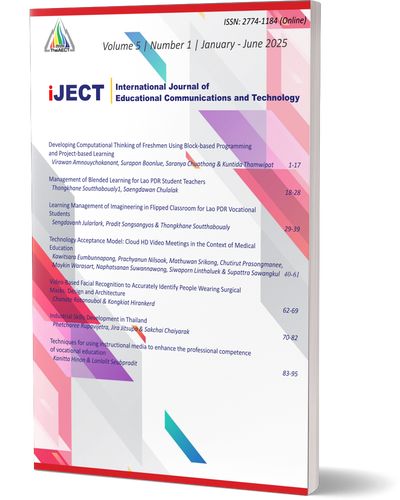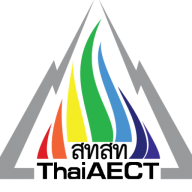Design of a Workshop Training Course based on the Sufficiency Economy Philosophy for Sustainable Electricity use for Provincial Electricity Authority Employees
Keywords:
Workshop training, Sufficiency economy philosophy, Sustainable innovation, Sustainable electricity, Provincial electricity authorityAbstract
The study aimed to assess the effectiveness of a workshop training course on social innovation or the sufficiency economy (SEP) principles for sustainable innovation (SI) of sustainable electricity use among provincial electricity authority personnel. The results revealed that the quality of the content (M = 4.78, SD = 0.58) and the media (M = 4.50, SD = 0.58) of a workshop training course based on the SEP for sustainable electricity use of provincial electricity authority personnel by the 9 experts was at the greatest level. The design of a workshop training course based on SEP for SI of sustainable electricity use for provincial electricity authority personnel to enhance learning achievement was efficient by E1/E2 (82.40/81.33) by the specified hypothesis 80/80. The significant difference between pretest (M = 14.44, SD = 0.88) and posttest (M =16.11, SD = 1.05) scores of a workshop training course based on SEP for SI of sustainable electricity use for provincial electricity authority personnel were at the 0.01 level. Then, the provincial electricity authority personnel's satisfaction with a workshop training course based on the SEP for sustainable electricity use was at the highest level (M =4.90, SD = 0.12)
References
Alternative Energy Institute of Thailand Foundation. Driving the organization towards the electricity of the future. (2017). 33–34. https://aeitfthai.org/article/3102.html. Accessed 20 July 2022.
Altıntaş, H., & Kassouri, Y. (2020). The impact of energy technology innovations on cleaner energy supply and European carbon footprints: a linear versus nonlinear approach. Journal of Cleaner Production, 276, 124140.
Azzam, J. E., Barlatier, P., & Dupouët, O. (2023). Les grands auteurs en management de l'innovation et de la créativité. Les Grands Auteurs en Management de l'innovation et de la créativité, 184-208. https://doi.org/10.3917/ems.burge.2023.01.0184
Berlilana & Mu’amar,. (2024). Bio-coal business in Finland. Biomass Bioenergy. 2014; 63: 198–209.
Berlilana & A. Mu’amar. (2024). Economic decentralization through blockchain opportunities, challenges, and new business models. Journal of Current Research in Blockchain, 2(1), 1–10. http//:doi: 10.47738/jcrb.v1i2.14.
Bhatt, S. P., Rabe, K. F., Hanania, N. A., Vogelmeier, C. F., Bafadhel, M., Christenson, S. A., & Robinson, L. B. (2024). Dupilumab for COPD with blood eosinophil evidence of type 2 inflammation. New England Journal of Medicine, 390(24), 2274-2283.
Bocken, N., Pinkse, J., Darnall, N., & Ritala, P. (2023). Between circular paralysis and Utopia: organizational transformations towards the circular economy. Organization & Environment, 36(2), 378-382.
Böhm, F., Mogensen, B., Engstrøm, T., Stankovic, G., Srdanovic, I., Lønborg, J. & James, S. (2024). FFR-guided complete or culprit-only PCI in patients with myocardial infarction. New England Journal of Medicine, 390(16), 1481-1492.
Chabowski, B. R., Gabrielsson, P., Hult, G. T. M., & Morgeson III, F. V. (2023). Sustainable international business model innovations for a globalizing circular economy: a review and synthesis, integrative framework, and opportunities for future research. Journal of International Business Studies, 1-20.
Collaboration, D. E. S., Abbott, T. M. C., Acevedo, M., Aguena, M., Alarcon, A., Allam, S., & Walker, A. R. (2024). The Dark Energy Survey: Cosmology Results with∼ 1500 New High-redshift Type IA Supernovae Using the Full 5-Yr Data Set. The Astrophysical Journal Letters, 973(1), L14.
Dumas C, Beinecke RH. Change leadership in the 21st century. J Organ Change Manag, 8(31), 867–876. https://doi.org/10.1108/JOCM-02-2017-0042.
Finkel, D., Nilsen, C., Sindi, S., & Kåreholt, I. (2024). Impact of childhood and adult socioeconomic position on change in functional aging. Health Psychology, 43(5), 388.
Forrestal, S. G., D’Angelo, A. V., & Vogel, L. K. (2015). Considerations for and lessons learned from online, synchronous focus groups. Surv Pract 8(3): 1–8. http//: doi: 10.29115. SP-2015-0015.
Gifford, T. (2024). The Story of Nature: A Human History: Mynott, J. (2024). The Story of Nature: A Human History. Yale University Press.
Gilchrist, A., & Gilchrist, A. (2016). Industrial Internet Use-Cases. Industry 4.0: The Industrial Internet of Things, 13–31.
Goddard, R., Colloff, M. J., Wise, R. M., Ware, D., & Dunlop, M. (2016). Values, rules, and Knowledge: Adaptation as a change in the decision context. Environmental science & policy, 57, 60–69.
Hananto, A. R. & Srinivasan, B. (2024). Comparative analysis of ensemble learning techniques for purchase prediction in digital promotion through social network advertising. Journal of Digital Marketing and Digital Currents. 1(2), 125–143. http//:doi: 10.47738/jdmdc.v1i2.7.
Hariguna, T. & Chen, S. C. (2024). Customer segmentation and targeted retail pricing in digital advertising using Gaussian mixture models for maximizing gross income. Journal of Digital Marketing and Digital Currents, 2(1). 11–20. http://doi: 10.47738/jdmdc.v1i2.11.
Hayadi, B. H. & Emary, I. M. M. E. (2024). Predicting campaign ROI using decision trees and random forests in digital marketing. Journal of Digital Marketing and Digital Currents, 1(1), 1–8. http//:doi: 10.47738/jdmdc.v1i1.5.
Huang, Z., Wang, Z., Xia, S., Li, X., Zou, H., Xu, R., ... & Liu, P. (2024). Olympic arena: Benchmarking multi-discipline cognitive reasoning for superintelligent AI. Advances in Neural Information Processing Systems, 37, 19209–19253.
Irena, Š., Martin, B., Josef, N., Tomáš, P., & Michal, B. (2024). Comparison of periphyton growth on two artificial substrates in temperate zone fishponds. Aquaculture International, 32(7), 10301-10311.
Johnson, S., & Acemoglu, D. (2023). Power and Progress: Our Thousand-Year Struggle Over Technology and Prosperity Winners of the 2024 Nobel Prize for Economics. Hachette UK.
Kantabutra, S., & Punnakitikashem, P. (2020). Exploring the process toward corporate sustainability at a Thai SME. Sustainability, 12(21), 9204.
Kodjo, G., Suwan, M., Wattanakul, W., Boonchai, T., Choochat, C., & Semmahasak, C. (2024). Application guidelines in applying Sufficiency Economy Philosophy (SEP) for the farmers in Djakotomey district, Benin. A Mater’ Thesis of Arts program in Science, Chaingmai Rajabhat University.
Lehtonen, T., & Heikkurinen, P. (2022). Sufficiency and sustainability: Conceptual analysis and ethical considerations for sustainable organization. Environmental Values, 31(5), 599-618.
Leithwood, K., Sun, J., Schumacker, R., & Hua, C. (2023). Psychometric properties of the successful school
Leadership survey. Journal of Educational Administration, 61(4), 385-404.
Li, Y., Zhang, Y., Timofte, R., Van Gool, L., Yu, L., Li, Y. & Wang, X. (2023). NTIRE 2023 challenge on efficient super-resolution: Methods and results. In Proceedings of the IEEE/CVF Conference on Computer Vision and Pattern Recognition. 1922-1960.
Medias, F., Rosari, R., Susamto, A. A., & Ab Rahman, A. B. (2024). A bibliometric analysis on innovation in philanthropy research: a study based on Scopus database. International Journal of Innovation Science, 16(4), 748-771.
Mihardjo, L. W., & Alamsjah, F. (2020, February). Moderating effects of green on the relationship between organizational agility, customer experience, and digital service innovation to achieve sustainable performance. In IOP Conference Series: Earth and Environmental Science, 426(1), 012118.
Narmanov, U. (2022). The role and importance of the digital economy in the development of innovation. Linguistics and Culture Review, 6(S1), 121–133.
Nguyen, V. T. T., Law, M. G., & Dore, G. J. (2008). An enormous hepatitis B virus‐related liver disease burden is projected in Vietnam by 2025. Liver International, 28(4), 525–531.
Parmesan, C., Morecroft, M. D., Trisurat, Y., Adrian, R., Zakaria Anshari, G., Arneth, A., & Young, K. (2023). Terrestrial and freshwater ecosystems and their services. https://www.ipcc.ch/report/ar6/wg2/downloads/report/IPCC_AR6_WGII_Chapter02.pdf
Prayukvong, W., Puntasen, A., John Foster, M., & Moopauak, K. (2024). The sufficiency economy philosophy as an approach to social innovation: case studies of local governments in Thailand. Innovation: The European Journal of Social Science Research, 37(1), 118-135.
Purvis, B., Mao, Y., & Robinson, D. (2019). Three pillars of sustainability: in search of conceptual origins. Sustainability science, 14, 681–695.
Ren, B., Li, Y., Mehta, N., Timofte, R., Yu, H., Wan, C., & Mudenagudi, U. (2024). The ninth ENTIRE 2024 efficient super-resolution challenge report. In Proceedings of the IEEE/CVF Conference on Computer Vision and Pattern Recognition, 6595-6631.
Rogers, H., Dora, M., Tsolakis, N., & Kumar, M. (2024). Plant-based food supply chains: Recognising market opportunities and industry challenges of pea protein. Applied Food Research, 4(2), 100440.
Rozanna, N., Adam, M., & Majid, M. S. A. (2019). Does job satisfaction mediate the effect of organizational change and organizational culture on employee performance of the Public Works and Spatial Planning Agency? IOSR. Journal of Business and Management, 21(1), 45-51.
Rungruang, T., Tanitteerapan, T., Sunthonkanokpong, W., & Jitgarun, K. (2023). The Impacts of Internal and External Factors on Developing Global Digital Innovation: A Case Study of the Provincial Electricity Authority in Thailand. In E3S Web of Conferences, 399, 07009. EDP Sciences.
Saputra, J. P. B. & Yadav, S. (2024). Modeling the impact of holidays and events on retail demand forecasting in online marketing campaigns using intervention analysis. Journal of Digital Marketing and Digital Currents, 2(1), 21–30. http//:doi: 10.47738/jdmdc.v1i2.9.
Stefanou, M. I., Palaiodimou, L., Theodorou, A., Christodoulou, M. V., Tzartos, J. S., Tzanetakos, D., & Giannopoulos, S. (2023). Safety of COVID-19 vaccines in multiple sclerosis: a systematic review and meta-analysis. Multiple Sclerosis Journal, 29(4-5), 585–594.
Stock, T., & Seliger, G. (2016). Opportunities of sustainable manufacturing in Industry 4.0. procedia CIRP, 40, 536-541.
Sutton, P. (2004). A perspective on environmental sustainability. Paper on the Victorian Commissioner for Environmental Sustainability, 1, 32. https://www.donboscogozo.org/images/pdfs/energy/A-Perspective-on-Environmental-Sustainability.pdf
Wang, L., Lurina, M., Hyytiäinen, J., & Mikkonen, E. (2014). Bio-coal market study: Macro and micro-environment of the bio-coal business in Finland. Biomass and bioenergy, 63, 198-209.
Wilson III, E. J., Goethals, G. R., Sorenson, G., & Burns, J. M. (2004). Leadership in the digital age. Encyclopedia of leadership, 4, 858-861.
Wu, C., Zhang, H., & Carroll, J. M. (2024). AI Governance in Higher Education: Case Studies of Guidance at Big Ten Universities. Future Internet, 16(10). 1-19. https://doi.org/10.3390/fi16100354
Xia, M., Gao, T., Zeng, Z., & Chen, D. (2024). Sheared Llama: Accelerating Language Model Pre-Training via Structured Pruning. Paper presented at 12th International Conference on Learning Representations, ICLR 2024, Hybrid, Vienna, Austria.
Downloads
Published
How to Cite
Issue
Section
License
Copyright (c) 2025 International Journal of Educational Communications and Technology

This work is licensed under a Creative Commons Attribution-NonCommercial-NoDerivatives 4.0 International License.







